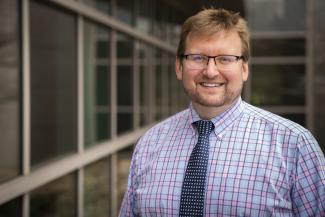Addressing the nation’s mechanical engineers at the Power 2022 Conference, NETL Director Brian Anderson, Ph.D., emphasized the importance of developing a diverse portfolio of technologies and an integrated approach to meet the Biden Administration’s timeline for decarbonization and accelerate the nation’s transition to a clean energy future.
“Engineers are problem solvers. My key message was that we need engineers, scientists and other dedicated researchers to collaborate with industry, academia and government in order to meet the President’s goals calling for a carbon-free power sector by 2035 and a net-zero carbon-emissions economy by 2050,” said Anderson, who served as a plenary speaker at the conference hosted by The American Society of Mechanical Engineers.
The four-day event was held this week in Pittsburgh, Pennsylvania, where NETL operates a research and development (R&D) site, and within close proximity to Morgantown, West Virginia, home to another NETL R&D facility. The Lab’s third R&D site is located in Albany, Oregon.
Anderson provided an overview of NETL’s diverse research capabilities. As the U.S. Department of Energy’s only government-owned, government-operated national lab, NETL has served the nation by developing technology solutions to energy challenges that have included mine safety, zirconium production, oil and gas extraction, acid rain mitigation and more. “Today, we’re facing an urgent need to address climate change, and NETL is working to develop the technologies needed to mitigate this next energy and environmental challenge,” Anderson said.
Anderson told the engineers that developing innovative technologies to ensure no communities are left behind as the nation undergoes a transformational shift to clean energy is a top NETL priority. Investments in carbon capture and sequestration, high-efficiency turbines, hydrogen hubs and other decarbonization technology can generate good-paying jobs and growth in communities whose economies have been tied to fossil energy and coal-fired power plants while cleaning up the legacy of environmental issues and damage these communities have endured.
NETL is significantly investing in technologies that can extract rare earth elements and critical minerals, which are vital to the manufacturing of electronics, energy infrastructure such as batteries, wind turbines and solar panels and defense systems, from coal ash, acid mine drainage and other wastes.
“These technologies not only remove toxic metals from the environment, but they also establish domestic supply chains of the materials needed to create good-paying manufacturing and clean energy jobs,” Anderson said.
Anderson was joined by a number of NETL experts who led conference programs and workshops. Among them was the Lab’s Nicholas Siefert, a research mechanical engineer, who chaired the conference track on water management, beneficial reuse and environmental issues. Projects led by Siefert include the co-treatment of flue gas desulfurization (FGD) effluent from Longview Power Plant in Maidsville, West Virginia, and produced water from oil and gas wells near Morgantown.
The research is focused on introducing produced water into FGD water treatment to generate barite, a critical mineral. Barite’s high density makes it an ideal weighting additive to drilling fluids to improve safety. Siefert was joined by NETL’s Heather Hunter and Jessica Mullen, who served as track co-chairs.
Other NETL researchers who participated in the conference and their presentation topics were:
- Biao Zhang — co-chair of conference track on Advanced Tools for Cyber-physical Systems and Digital Twins.
- David Tucker — Hyperparameter Optimization of Deep Learning Models for Compressor Air Leak Prediction in a Gas Turbine.
- Zhang, Nor Farida Harun, Rupen Panday, Nana Zhou, Tucker and Samuel Bayham — Rapid Load Response of a Solid Oxide Fuel Cell – Gas Turbine – Super Capacitor Hybrid System to Grid Demand.
- Zhou, Lawrence Shadle and Tucker — Evaluation of the Agent-Based Control Strategy Using a Cyber-Physical Fuel Cell/Gas Turbine Hybrid Facility.
- Hunter — Overview of the Water Management Research and Development Program at NETL.
- Eric Grol and Chad Able — Treatment Technology Assessment of Landfill Leachate.
- Grol — Student Panel: Perspectives on an Engineering Career in the Office of Fossil Energy and Carbon Management at the U.S. Department of Energy.
NETL is a U.S. Department of Energy national laboratory that drives innovation and delivers technological solutions for an environmentally sustainable and prosperous energy future. By leveraging its world-class talent and research facilities, NETL is ensuring affordable, abundant and reliable energy that drives a robust economy and national security, while developing technologies to manage carbon across the full life cycle, enabling environmental sustainability for all Americans.




